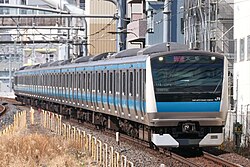電車
Appearance
See also: 电车
Chinese
[edit]| electric; electricity; electrical | vehicle on land; car; machine vehicle on land; car; machine; to shape with a lathe | ||
|---|---|---|---|
| trad. (電車) | 電 | 車 | |
| simp. (电车) | 电 | 车 | |



Etymology
[edit]The modern definitions are wasei kango (和製漢語), orthographically borrowed from Japanese 電車 (densha),[1] first attested in 《出使英法義比四國日記》 by Xue Fucheng in 1890.
Pronunciation
[edit]- Mandarin
- Cantonese (Jyutping): din6 ce1
- Hakka (Sixian, PFS): thien-chhâ
- Jin (Wiktionary): die3 ce1
- Southern Min
- (Hokkien, POJ): tiān-chhia
- (Teochew, Peng'im): diang6 cia1
- Wu (Shanghai, Wugniu): 6di-tsho
- Mandarin
- (Standard Chinese)+
- Hanyu Pinyin:
- Zhuyin: ㄉㄧㄢˋ ㄔㄜ
- Tongyong Pinyin: diànche
- Wade–Giles: tien4-chʻê1
- Yale: dyàn-chē
- Gwoyeu Romatzyh: diannche
- Palladius: дяньчэ (djanʹčɛ)
- Sinological IPA (key): /ti̯ɛn⁵¹ ʈ͡ʂʰɤ⁵⁵/
- (Standard Chinese)+
- Cantonese
- (Standard Cantonese, Guangzhou–Hong Kong)+
- Jyutping: din6 ce1
- Yale: dihn chē
- Cantonese Pinyin: din6 tse1
- Guangdong Romanization: din6 cé1
- Sinological IPA (key): /tiːn²² t͡sʰɛː⁵⁵/
- (Standard Cantonese, Guangzhou–Hong Kong)+
- Hakka
- (Sixian, incl. Miaoli and Neipu)
- Pha̍k-fa-sṳ: thien-chhâ
- Hakka Romanization System: tien caˊ
- Hagfa Pinyim: tian4 ca1
- Sinological IPA: /tʰi̯en⁵⁵ t͡sʰa²⁴/
- (Sixian, incl. Miaoli and Neipu)
- Jin
- (Taiyuan)+
- Wiktionary: die3 ce1
- Sinological IPA (old-style): /tie⁴⁵ t͡sʰɤ¹¹/
- (Taiyuan)+
- Southern Min
- (Hokkien)
- Pe̍h-ōe-jī: tiān-chhia
- Tâi-lô: tiān-tshia
- Phofsit Daibuun: diexnchiaf
- IPA (Xiamen): /tiɛn²²⁻²¹ t͡sʰia⁴⁴/
- IPA (Quanzhou): /tiɛn⁴¹⁻²² t͡sʰia³³/
- IPA (Zhangzhou): /tiɛn²²⁻²¹ t͡sʰia⁴⁴/
- IPA (Taipei): /tiɛn³³⁻¹¹ t͡sʰia⁴⁴/
- IPA (Kaohsiung): /tiɛn³³⁻²¹ t͡sʰia⁴⁴/
- (Teochew)
- Peng'im: diang6 cia1
- Pe̍h-ōe-jī-like: tiăng tshia
- Sinological IPA (key): /tiaŋ³⁵⁻¹¹ t͡sʰia³³/
- (Hokkien)
- Wu
- Middle Chinese: denH tsyhae
- Old Chinese
- (Baxter–Sagart): /*lˤi[n]-s [t.qʰ](r)A/
- (Zhengzhang): /*l'iːns kʰlja/
Noun
[edit]電車
- tram; streetcar
- (Taiwan or Japan) electric multiple unit train
- (Mainland China, Hong Kong) electric vehicle
- (Xiamen and Zhangzhou Hokkien, dated) automobile; motor car; sedan
- (historical, obsolete) an ancient covered chariot specialized in raiding enemy camps
Usage notes
[edit]In Mainland China, in the context of trains, 電車/电车 only refers to trains in Japan.
Synonyms
[edit]Derived terms
[edit]References
[edit]- ^ 汉语外来词词典 [Chinese Loanword Dictionary] (in Chinese), 1984, page 270
Japanese
[edit]Etymology
[edit]| Kanji in this term | |
|---|---|
| 電 | 車 |
| でん Grade: 2 |
しゃ Grade: 1 |
| on'yomi | |
電 (den, “electric”) + 車 (sha, “vehicle”)
Pronunciation
[edit]- (Tokyo) でんしゃ [dèńshá] (Heiban – [0])[1][2]
- (Tokyo) でんしゃ [déꜜǹshà] (Atamadaka – [1])[1][2]
- IPA(key): [dẽ̞ɰ̃ɕa̠]
Audio: (file)
Audio: (file)
Noun
[edit]Derived terms
[edit]See also
[edit]References
[edit]- ↑ 1.0 1.1 NHK Broadcasting Culture Research Institute, editor (1998), NHK日本語発音アクセント辞典 [NHK Japanese Pronunciation Accent Dictionary] (in Japanese), Tokyo: NHK Publishing, Inc., →ISBN
- ↑ 2.0 2.1 Matsumura, Akira, editor (2006), 大辞林 [Daijirin] (in Japanese), Third edition, Tokyo: Sanseidō, →ISBN
Korean
[edit]| Hanja in this term | |
|---|---|
| 電 | 車 |
Noun
[edit]Categories:
- Chinese terms borrowed from Japanese
- Chinese orthographic borrowings from Japanese
- Chinese terms derived from Japanese
- Wasei kango
- Chinese terms borrowed back into Chinese
- Mandarin terms with audio pronunciation
- Chinese lemmas
- Mandarin lemmas
- Cantonese lemmas
- Hakka lemmas
- Jin lemmas
- Hokkien lemmas
- Teochew lemmas
- Wu lemmas
- Middle Chinese lemmas
- Old Chinese lemmas
- Chinese nouns
- Mandarin nouns
- Cantonese nouns
- Hakka nouns
- Jin nouns
- Hokkien nouns
- Teochew nouns
- Wu nouns
- Middle Chinese nouns
- Old Chinese nouns
- Chinese terms with IPA pronunciation
- Chinese terms spelled with 電
- Chinese terms spelled with 車
- Taiwanese Chinese
- Japanese Chinese
- Mainland China Chinese
- Hong Kong Chinese
- Xiamen Hokkien
- Zhangzhou Hokkien
- Chinese dated terms
- Chinese terms with historical senses
- Chinese terms with obsolete senses
- Literary Chinese terms with quotations
- Beginning Mandarin
- zh:Transport
- Japanese terms spelled with 電 read as でん
- Japanese terms spelled with 車 read as しゃ
- Japanese terms read with on'yomi
- Japanese compound terms
- Japanese terms with IPA pronunciation
- Japanese terms with audio pronunciation
- Japanese lemmas
- Japanese nouns
- Japanese terms spelled with second grade kanji
- Japanese terms spelled with first grade kanji
- Japanese terms with 2 kanji
- Japanese informal terms
- ja:Rail transportation
- Korean lemmas
- Korean nouns
- Korean nouns in Han script
- Korean hanja forms



